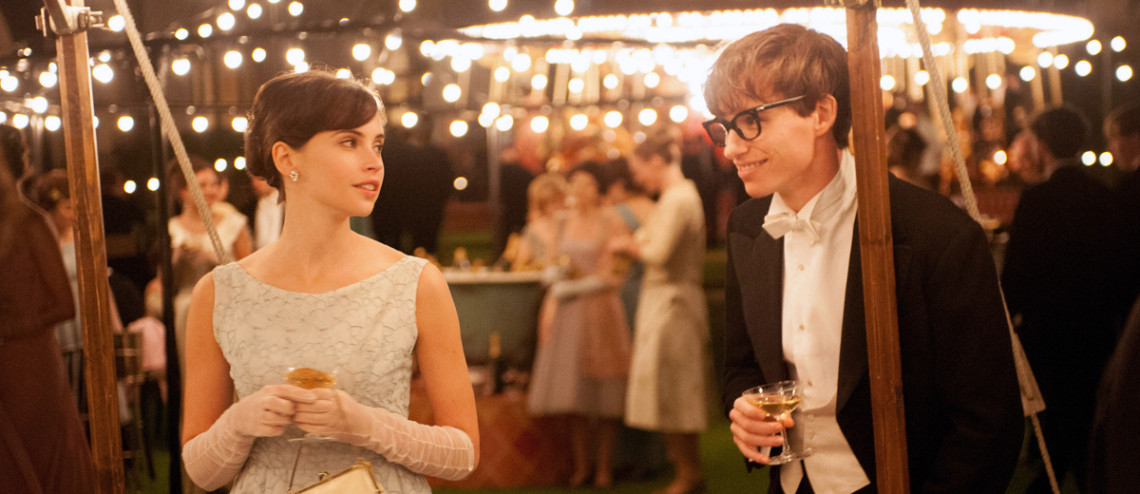Simplicity is the key in explaining the most complex occurrences. James Marsh’ The Theory of Everything is yet another proof – and a perfect example – of this statement. The Oscar-winning documentarian paints a portrait of one of the most outstanding minds of contemporary culture, Stephen Hawking, the brilliant English cosmologist, theoretical physicist and author of “A Brief History of Time.” Based on Jane Hawking’s memoir “Traveling to Infinity: My Life with Stephen Hawking,” the film is molded more by the astrophysicist’s former wife’s perspective, using the prism of Hawking’s personal journey to open the door of interpretation to his academic work. To its merit, the personal and professional are in Hawking’s case inseparably intertwined, forming a hell of a story, presented without unnecessary embellishments, with a powerful emotional load, leaving a lasting impression on the viewer.
There has been a few attempts to tell Hawking’s story, including Errol Morris’s A Brief History of Time and the BBC TV-movie “Hawking” from 2004, starring none other than Benedict Cumberbatch. (Cumberbatch wound up, more fittingly, starring as Alan Turing in The Imitation Game, which premiered at TIFF this year, alongside this film.) Here, Hawking is played by the young Brit Eddie Redmayne, who made a big splash with his work in Les Miserables and My Week with Marilyn and has made the most of this chance. His performance required months of preparation, consultations with neurologists, choreographers and Hawking himself – a task even more challenging for him and his on-screen spouse Felicity Jones, given that both of their characters are alive and might see the film. Redmayne had to recreate Hawking’s ALS-driven transformation with scarce archival visual resources documenting its early stages – and succeeded. But he also managed to create a portrait of a man, who, amidst the most traumatic physical trepidations, never lost the sharpness of his visionary mind and appetite for life. Luckily, Hawking’s ironic humor, flirtatiousness, and self-distance are all present on screen, as he sinks deeper into diminishing gestures and whims with the time passing, finally expressed only by scarce glances and via the voice generator, which remains vivid among the stillness. Supported by the equally impressive Jones, Redmayne might have just earned his first major award nom.
Watching the trailer, one might get reluctant: what’s with all those “Love is everything” quotes and teary, dramatic music? No worries: in the film, Jóhann Jóhannsson’s score tends to the plot with intuition and subtlety. And what seems to be Marsh’s biggest strength as a director with a documentary background is an ability to find just enough emotional potential in the story itself, without reaching for fake narrative stimulants and phony tricks. The Theory of Everything is, in its nature, very emotionally powerful – it has to be, as the Hawkings’ story is a ready-made drama, with love, crisis, overcoming weakness, defeat, and success. But what keeps the tension flowing, the plot engaging, and the drama believable is the honesty of Anthony McCarten script.
McCarten acknowledges the clumsiness and conflict of romance, the unglamorous despair of struggling physicality, as well as the sweat and bitterness behind every tiny success. Hawking’s way to the top is bumpy and all but conventional. But led by Jane’s loving eloquence and perceptiveness, McCarten doesn’t take the easy way out, creating characters who are not bleak, commercialized versions of their originals. Redmayne’s Stephen and Jones’ Jane are full-blooded, engaging people who don’t spend their whole days writing equations, loving eternally and dedicating their happiness for the abstract greater good. Always somehow charming, they can be egotistic jokers who oversleep, have terrible pickup lines, and sport nasty habits. The freedom of feeling this film gives the viewer is refreshing. Instead of being pushed into some arbitrarily imposed canons, one can define what a happy ending is themselves. The unconventional Hawkings – married for 30 years, divorced for 20 afterwards, but still friendly – probably know it best.




















